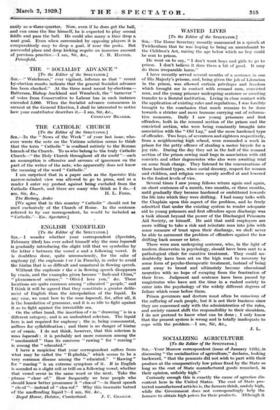WASTED LIVES
[To the Editor of SPECTATOR.] Sri,—The Home Secretary recently announced in a speech at Twickenham that he was hoping to bring an amendment to the Children's Act, raising the age below Which no boy could be sent to prison.
He went on to say, " I don't want boys and 'girls to go to prison. I don't believe it does them a bit of good. It may do them irreparable harm."
I have recently served several months of a sentence in one of His Majesty's prisons, and, being given the job of Librarian in the prison, was allowed certain privileges and freedom which brought me in contact with remand men, convicted men, and the young prisoner undergoing sentence or awaiting transfer to a Borstal institution. Living in close contact with the application of existing rules and regulations, I was forcibly brought to the conclusion that much remains to be done towards a stricter and more humane carrying out of reforma- tive measures. Daily I saw young prisoners and first offenders, both in the remand section of the prison and the convicted section, who were being constantly brought into association with the " Old Lag," and the more hardened type of offender. Two boys, of seventeen and eighteen respectively, from a neighbouring high school, were remanded a week in prison for the petty offence of stealing a motor bicycle for a joy ride. During the day they sat in the hall of the remand section of the prison sewing mail bags in association with old convicts and other degenerates who also were awaiting trial on some fresh charge. They listened to the conversations of these hardened types, when social decency, respect for women and children, and religion were openly scoffed at and lowered to the foulest levels of vice.
Several times I saw young fellows return again and again, on short sentences of a month, two months, or three months, until gradually they became hardened or embittered towards the life into which they were drifting. I had many talks with the Chaplain upon this aspect of the problem, and he freely admitted that under the existing system to render adequate aid to young prisoners and first offenders upon discharge was a task almost beyond the power of the Discharged Prisoners Aid Society, or himself. He said that until employers are more willing to take a risk and reinstate men into jobs with some measure of trust upon their discharge, we shall never be able to surmount the problem of offenders against the law drifting back sooner or later.
There were men undergoing sentence, who, in the light of modern discoveries in psychology, should have been sent to a pathological clinic for curative treatment. They could un- doubtedly have been set on the high road to recovery by some form of psycho-therapeutic treatment, instead of being sent away to brood and ultimately become obsessional neurotics with no hope of escaping from the frustration of their lives. Judgment and sentence have been passed by magistrates who have not the time in a rushed society to enter into the psychology of the widely different degrees of failure which come before them.
Prison governors and doctors must often be conscious of the suffering of such people, but it is not their business since they are concerned only with the administration of the rules, and society cannot shift the responsibility to their shoulders. I do not pretend to know what can be done ; . I only know that the present system is wrong and is totally inadequate to cope with the problem.—I am, Sir, &c., J. L.
























































 Previous page
Previous page